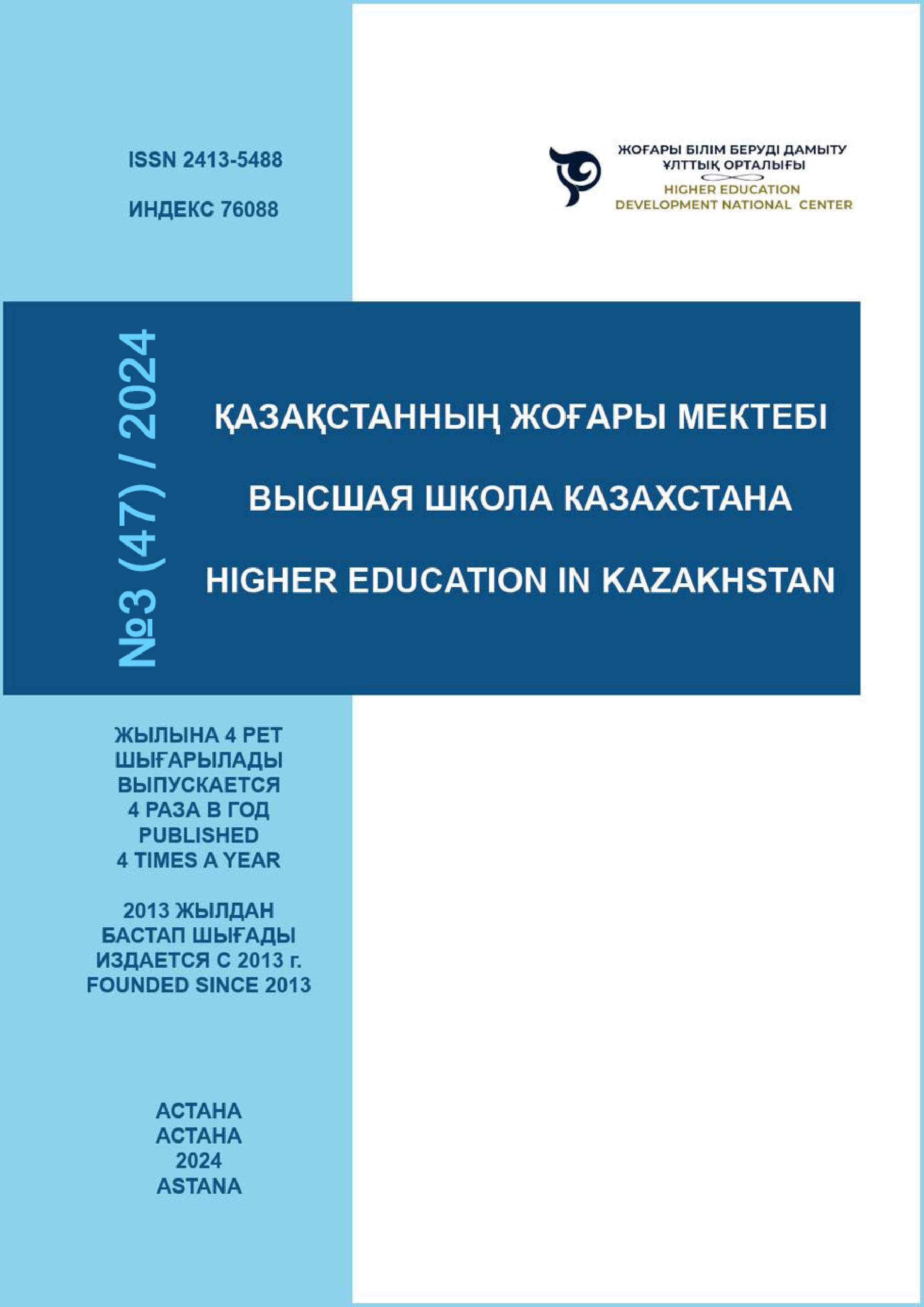INTEGRATION OF THE UNIVERSITY STUDENTS’ KNOWLEDGE THROUGH NEW INFORMATION TECHNOLOGIES
DOI:
https://doi.org/10.59787/2413-5488-2024-47-3-87-105Abstract
The article touches upon the ways of implementing the integration of the university students’ knowledge through new information technologies, the content and methodology of integrating the knowledge of students based on the use of new information technologies in the educational process of the university, and as well as the results of specially organized practical-experimental work. The authors conducted research to integrate the improvement of the quality of education through information technologies. The purpose of the research is to justify theoretically the integration of university students’ knowledge through new information technologies and to prove its effectiveness in practice.
Pedagogical aspects of the modeling process, stages of pedagogical modeling are presented in the article. The article also presents the methodological, procedural (technological) and instrumental levels of the model, its purpose, monitoring of the formation of necessary competencies, as well as the result. The model shows the logical-structural nature of the implementation of integration of the university students’ knowledge through new information technologies, the rules, principles, and conditions of competence formation. Students can master the integrated educational material through new information technology equipment, understanding the importance of digested knowledge, it is determined that one can use it independently as needed, and it is proven that the quality of individual education is at a high level.
The study touches upon the process of integrating the knowledge of university students using the concepts of "The use of new information technologies", "Integration through new information technologies", and formed a reference of the scientific and methodological basis for the integration of students' knowledge through new information technologies. From scientific point of view, the methodological basis for the development of integrated programs and projects in general education and special disciplines, including the specifics of the information technology, has revealed the decisions of the task.
References
Amrenova, M. (2013). Organization of methodological work in college: textbook. Omsk: Publishing House Omsk State Pedagogical University, 226.
Bapiyev, I., Kamalova, G., Yermukhambetova, F., Khairullina, A. & Kassymova,A. (2021). Neural network model of countering network cyber attacks using expert knowledge. Journal of Theoretical and Applied InformationTechnology, 99(13), 3179-3190.
Billett, S. (2015). Integrating Practice-Based Experiences with Higher Education. 10.1007/978-94-017-7230-3_1. https:// /doi.org/10.1007/978-94-017-7230-3_1
Chebanov, K. (2016). Formation of professional competencies of college students. Modern problems of science and education, 4.
Dakhin, А. (2010). Modeling in pedagogy. Ideas and ideals, 1(3),11–20.
Davletova, A., Kassymova, A., Mukanova, A., Bisenova, G. & Zhanuzakova, Z. (2018). Digital educational resources as part of a digital educational space for a future computer teacher. Indian Journal of Science and Technology, 5(2), 306-324. https://doi.org/1444-8939.2018/5-5/MRR.34.
Davletova, A., Kopeyev, Z., Yermagambetova, M., Balgozhina, G., Kassymova, A. & Tazhigulova, A. (2021) Problems of inconsistency and didactic functions of ict tools in computer science courses. Webology, 18 (2), 273-294. https:// /doi.org/10.14704/WEB/V1812/WEB18321
Davletova, A., Mukanova, A., Bissenova, G. & Kassymova, A. (2021) Digital educational resources as part of a digital educational space for a future computer teacher. Eastern European Journal of Enterprise Technologies. https://doi.org/10.15587/1729-4061.2021.249278.
Government of the Republic of Kazakhstan (2010). State Program of Education development of the Republic of Kazakhstan for 2011-2020. Decree of the President of the Republic of Kazakhstan dated December 7, 2010 № 1118. https://adilet.zan.kz/rus/docs/U1000001118
Government of the Republic of Kazakhstan (2019). State program of Education development of the Republic of Kazakhstan for 2020-2025. Resolution of the Government of the Republic of Kazakhstan No. 988. https://adilet.zan.kz/rus/docs/P1900000988
Klimenko, E. (2005). Educational process management as innovative activity of a teacher. Fundamental research, 9, 60-62. https://fundamental-research.ru/ru/article/view?id=6601
Kudryavtseva, L. (2014). Integrated Lesson as a Means of Forming Communicative Competence. Developing education.
Kurmangaliyeva, R. (2016). Modern trends of informatization is the educational process of the university. Bulletin of the Innovative Eurasian University., 2 (2), 62.
Medeshova, A. (2024). Methods of teaching computer science https://stepik.org/course/97345
Medeshova, А., Kassymova, А., Mutalova, Z. & Kamalova, G. (2022). Distance Learning Activation in Higher Education. European Journal of Contemporary Education, 11(3), 831-845. https://doi.org/10.13187/ejced.2022.3.831
Meshcheryakov, V. & Zemlyansky, A. (2009). Integration processes is the educational system "college-university". News of higher educational institutions. Volga region. Humanitarian science,. 2 (10), 115–121.
Mukhametzyanova, G. (2002). College is an innovative type of secondary vocational educational institution. Kazan.
Nekrasova, S. (2016). Formation of professional competence of students.Young scientist,17, 140-142
Yerzhanova, A., Kassymova, A., Abdikerimova, G., Tashenova, Z.& Nurlybaeva E. (2021). Analysis of the spectral properties of wheat growth in different vegetation periods. Eastern-European Journal of Enterprise Technologies https://doi.org/10.15587/1729-4061.2021.249278.














